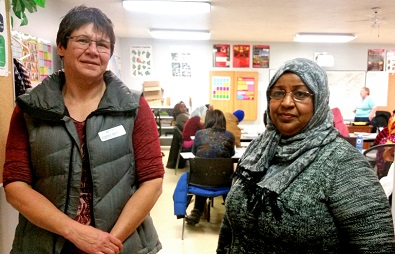Organizations in Saskatchewan’s four biggest cities are gearing up to support nearly 2,000 incoming Syrian refugees before year’s end.
On Friday, the federal government’s Citizens and Immigration office held a phone conference with Prince Albert YWCA’s settlement services. They were told that the city will see 210 new faces from crisis-ridden Syria over the next two months.
This came as no surprise, said Prince Albert YWCA’s CEO Donna Brooks. She points to the Liberal election promise to bring over 25,000 refugees by the end of the year.
“We knew that once the Liberals were elected, that we would be expecting something, we just weren’t quite sure as to when and how many,” Brooks said.
Currently, four different cities – Prince Albert, Saskatoon, Moose Jaw, and Regina – already hold contracts to take in a certain number of government-sponsored refugees each year. The feds have called on these cities to take on the influx, with 770 expected to land in both Saskatoon and Regina. Prince Albert and Moose Jaw expect to take in 210 refugees.
Prince Albert typically takes in 50 refugees each year, so Brooks says they’re equipped to handle the needs of the Syrian newcomers. She does expect things to be hectic over the next few months as they set up housing, food, and possible jobs for the newcomers.
“We’re timesing everything by four, so the more we can have done ahead of time, the better. So we’ve been having team meetings, contacting landlords about housing, getting things ready on the ground as far as talking to other people in the community, you know, trying to make contacts with the health district,” Brooks said.
Brooks says most of their clients are families, and expects this to be much the same. In terms of what settlement services, she’s planning as though the incomers will be 50 families of four.
Lots of people are wondering how the Liberal government plans to house 25,000 refugees in Canada. But Brooks says that’s no sweat in Prince Albert.
“Whatever the reason, it seems to be a little bit of a lull in the housing market and we think that that’s not going to be our biggest issue,” Brooks said.
When refugees first come over, they’re usually hosted in hotels until permanent housing is available.
She expects the biggest challenge will be moving quickly, which will temporarily tax resources in Prince Albert: “it’s a lot of people in a short period of time,” Brooks said.
But she’s also worried that unfounded fears in the community will keep people from welcoming the newcomers, and encourages people to research the Syrian war and get educated.
“The more we know and the more we learn, the less afraid we are,” she said.
While Canada’s commitment to take in 25,000 Syrian refugees, made to the United Nations, has been controversial lately, Brooks says she has the benefit of not needing to wade into the debate.
The facts are, accepting these refugees – who are fleeing conflict – fits into the YWCA’s humanitarian mandate.
“Our mandate is to help people, whether they’re homeless, whether they’re refugees, whether they’re victims of domestic violence,” Brooks said.
“I hope our community welcomes them, there will also be some that will come and they’ll be able to contribute to the economy,” she said.
Even before the refugees take their flights to Canada, Prince Albert’s economy has benefited. The YWCA has filled three temporary settlement counsellor positions.
For areas in the service industry that have trouble filling jobs, refugees could possibly end up working at places like Tim Horton’s or at restaurants in need of dishwashers.
